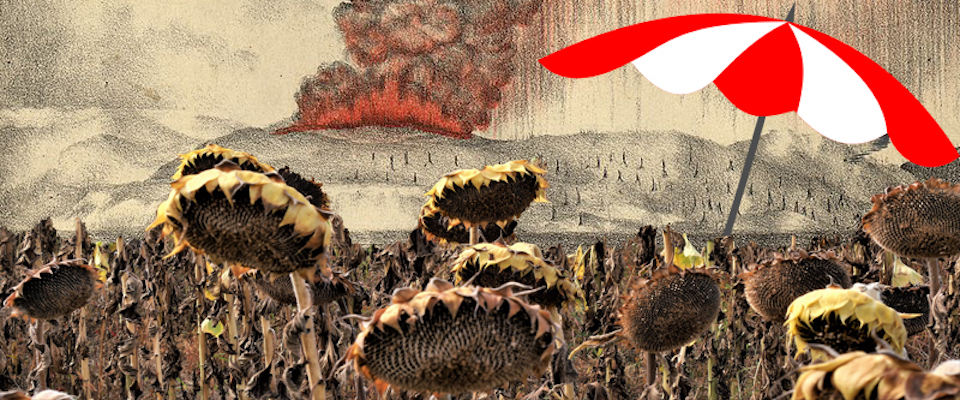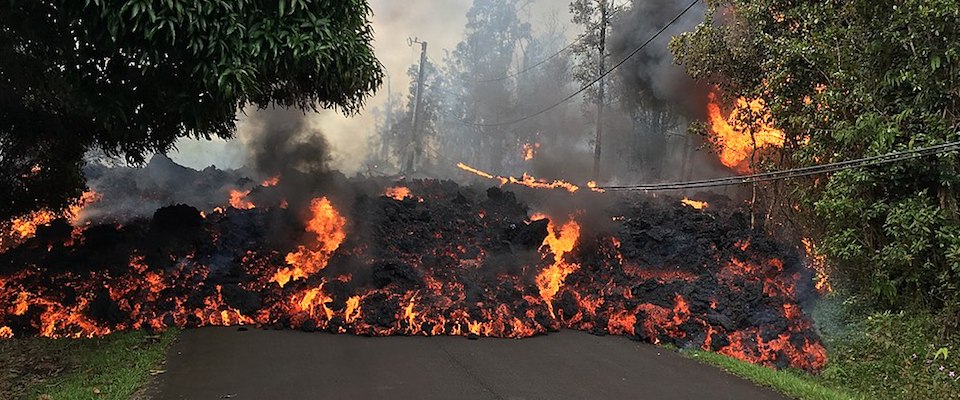Volcanic Umbrella
When Mt. Pinatubo exploded in the northern Philippines in 1991, it spewed millions of tons of sulfur dioxide into the atmosphere. For nearly two years, that sunlight-blocking plume acted as a sort of volcanic “umbrella,” cooling the Earth by almost 1 degree Fahrenheit. As climate change increasingly alters our lifestyles and embeds itself into our collective consciousness, geoengineering—in this case, humans playing volcano to replicate this cooling event—became a fascinating idea.
But as fun as it sounds, deploying a giant, aerosol umbrella could create as many problems as it solves, according to a new study in Nature led by UC Berkeley researchers. Sure, cooler temperatures might help plant growth by reducing heat stress, but plants need sunlight to survive. The decrease in sunlight would likely hurt productivity, cancelling out increases in crop yields.
When it comes to agriculture, “the unintended impacts of solar geoengineering are equal in magnitude to the benefits,” lead author Jonathan Proctor, a Berkeley Ph.D. candidate in the Department of Agricultural and Resource Economics, told Berkeley News. “It’s a bit like performing an experimental surgery; the side-effects of treatment appear to be as bad as the illness.”
Oscar-Worthy
It’s award season for student filmmakers, and UC Berkeley’s Graduate School of Journalism is looking to defend their titles. In 2016, Daphne Matziaraki ’16 won gold in the Documentary category. Last year, Brad Bailey ’17 took home the top honor.
Just last week, the Student Academy Awards released their lists of finalists, setting a J-School record. Four recent Berkeley grads took three of the seven spots for best documentary from a U.S. film school: Lauren Schwartzman for “Dust Rising,” Grace Oyenubi and Nani Walker for “Forced,” and Alan Toth for “Mining Phosphorus.”
Their films, respectively, cover the incredible health and climactic impacts of dust, the personal stories of three women whose Nigerian village was invaded by Boko Haram, and a local battle over phosphate mining in Florida.
Jon Else, a J-School teacher and the former head of its documentary program, said that Berkeley’s stellar showing is due, in part, to how the films are “about real stuff—stuff that matters.”
House of Cards
Speaking of the real stuff, a lot went down in Washington this week.
“In nearly simultaneous proceedings in two courtrooms 240 miles apart Tuesday, all eyes turned to the man who wasn’t there,” began an article by three reporters for the Los Angeles Times, including Cal alum Eli Stokols. “On a single day, indeed within a single hour, Trump’s former personal lawyer pleaded guilty to multiple crimes, and his former campaign chairman became a convicted felon.”
The ex-lawyer, Michael Cohen, admitted to illegally paying women to not go public with their alleged affairs with the president. Paul Manafort, the ex-campaign head, was convicted on 8 counts of bank and tax fraud.
What does this all mean for Trump? The jury’s still out on that one. But, as the article explains, the threat of prison time might “prompt both men to provide evidence to prosecutors against Trump himself, or against others in the president’s inner circle.” And Cohen’s admission that he behaved under direct orders from the president and in order to influence the election, “could put the president in direct legal jeopardy.”
Meanwhile in California, Rep. Duncan Hunter of Alpine, Calif. was indicted for major campaign finance violations. As Ben Christopher, graduate of the Goldman School of Public Policy, reported on Tuesday, Hunter and his wife spent a quarter-million dollars of campaign contributions on “theater tickets, school tuition, video games, dental procedures, and national and international vacations for both immediate and extended family, including a well-traveled rabbit.”
Living Off Uber
Uber and Lyft may seem ubiquitous, but their largest market in the country—New York City—is putting the brakes on unfettered ride-sharing expansion. In an effort to improve working conditions and reduce congestion, NYC’s City Council recently approved several bills supporting new regulations, which include: a cap on the number of drivers and a new proposed minimum wage of $17.22/hour.
How big of a boost would that be? According to a study by Berkeley’s Center on Wage and Employment Dynamics and The New School in NYC, average net pay would increase 22.5 percent. Currently, 85 percent of drivers make well below the proposed $17.22 hourly wage, and 40 percent of all drivers make little enough to qualify for Medicaid. And a whopping two-thirds of New York’s for-hire drivers—90 percent of whom are immigrants—have no other source of income. Given that “half of the drivers support children and provide the bulk of their family’s income,” as the study found, this is no small matter.
Would it make sense to apply the commission’s pay standard to other densely populated, über-expensive places? NYC’s transportation app industry, the study noted, “shares characteristics of the industry in other world-class cities, such as … San Francisco.”
Indecent Exposure?
And Berkeley’s battle royal between the far-right and their leftist adversaries continues. On August 5, a few dozen right-wing, “anti-Marxist” demonstrators met several hundred Antifa and socialist counter-protestors in a brouhaha reminiscent of—but less violent than—the 2017 mayhem that visited the city and university.
Between the yelling matches and scuffles, chants of “Nazi scum, we’ll shut you down, Berkeley is an immigrant town,” “No to Marxism in America,” and “Slave labor made America great” could be heard.
While no one appeared to be hurt, police said three dumpsters and a car had been set ablaze and 20 other vehicles were vandalized. At least 20 protestors were booked, primarily on suspicion of carrying banned weapons, vandalism, or “working with others to commit a crime.”
Later that day, the Berkeley PD stirred up some controversy in an unusual move. Before any of the arrested activists—chiefly from the left camp—were charged, officers published their names, photos, and cities of residence on Twitter. UC Hastings law professor Veena Dubal called the postings “very disturbing.”
“It seems like a public-shaming exercise, which is not the role of the police department,” said Dubal, a former Berkeley Police Review commissioner. “They are making it really accessible for folks who might wish these people harm to locate them.”
All Fired Up
If anyone’s had a rough go of the past several years’ fires, it’s the poor folks of Lake County, west of Sacramento. The Los Angeles Times found that since 2012, over half the county has burned. It’s also one of the counties most affected by the Mendocino Complex fire, the largest blaze in state history.
“Today, wildfires are burning more than twice the area than in the 1980s and 1990s,” reports Zeke Hausfather, a Ph.D. student with Berkeley’s Energy Resources Group. He says a link between climate change and our hellish fire seasons is clear—or, more precisely, that an attempt to disprove climate change’s role is bogus.
Climate change skeptics point to data from the National Interagency Fire Center (NIFC), which suggest that significantly more acres (think: a Nebraska-sized area of land) burned every year before 1960. But the NIFC tells Hausfather that folks “should not ‘put any stock’” in those numbers. Apparently data sources from before 1983, “are not known, or cannot be confirmed, and were not derived from the current situation reporting process.”
As UC Merced professor Anthony Westerling told Hausfather: “There is no question whatsoever that climate plays a role in the increase in fires.”





















